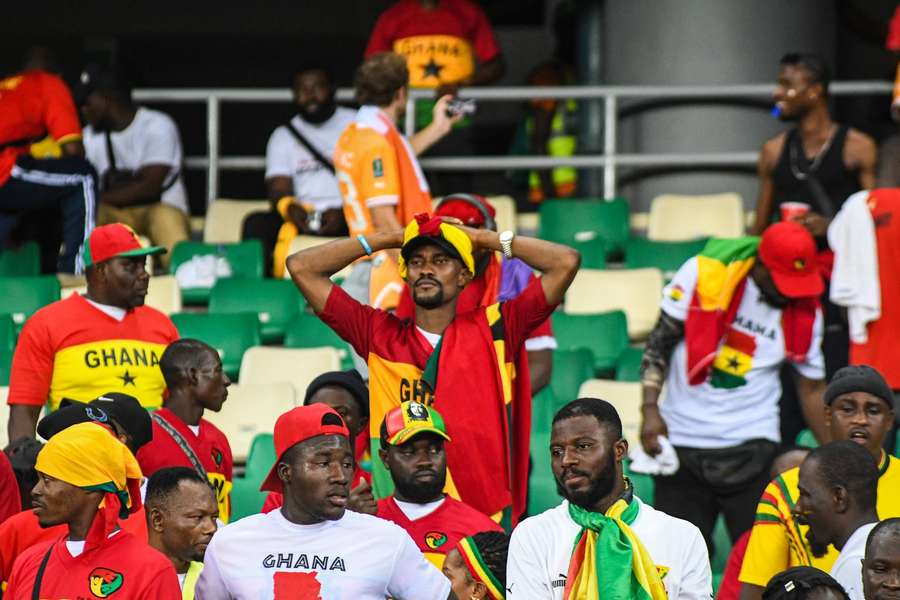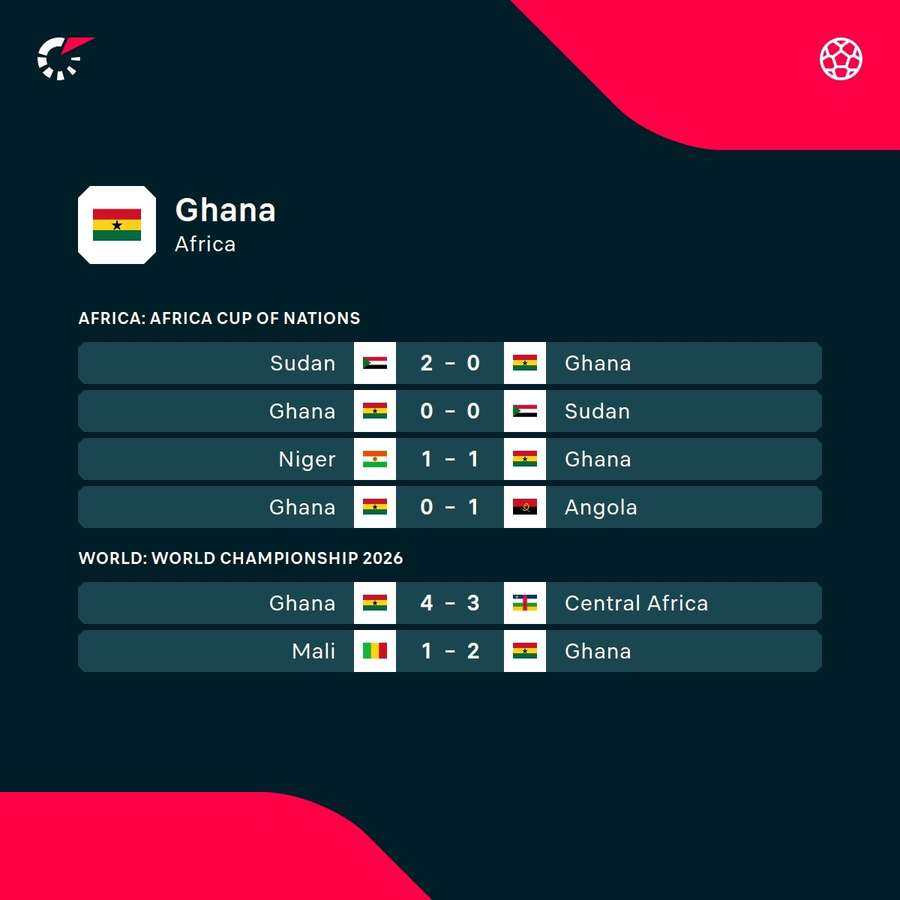OPINION: Ghana football is sinking and everyone is aware except the leaders

Since 2019, the Black Stars have drifted aimlessly, unable to secure a single victory in the Africa Cup of Nations (AFCON), their fate echoing the tragic tale of the Titanic - an unsinkable legend that met its icy demise in the North Atlantic.
The recent 2-0 defeat to Sudan has cast a shadow over Ghana’s hopes, threatening to plunge them into the depths of despair by potentially missing out on AFCON qualification for the first time in over two decades.
If Ghana fail to secure a spot in the upcoming AFCON, the repercussions will be swift and severe. Otto Addo, who was handed a 34-month contract with an option for a two-year extension, is expected to face the axe, followed by a thorough inquiry into the team's dismal performance.
There's now a clear case of Deja vu as this scenario has become all too familiar, with Ghanaian football leaders resorting to the same playbook whenever public anxiety rises.
Before 2017, the Black Stars maintained high standards, consistently reaching the AFCON semi-finals. However, since 2019, they have not tasted knockout football in any major tournament, revealing deep-rooted issues that have long gone unaddressed.
This turbulent period coincides with Kurt Okraku's presidency of the Ghana Football Association (GFA), which began in October 2019. Under his leadership, the Black Stars have cycled through a series of coaches - Charles Akonnor, Milovan Rajevac, Chris Hughton, and currently Otto Addo - each bringing their own vision yet failing to create lasting change. This carousel of leadership has bred confusion and inconsistency on the pitch as players grapple with adapting to ever-shifting tactics.
In just five years, 66 different players have been called up for various international fixtures and tournaments. Out of these, 41 have seen at least a minute of action for the national team. These statistics highlight a crucial reality: simply changing players and coaches will not resolve Ghana’s woes. The underlying issues are multifaceted and deeply entrenched.
Leadership is often cited as the cause; everything else is merely an effect. Thus, the current GFA cannot escape accountability for the impending crisis facing Ghanaian football. Ironically, this same GFA has repeatedly appointed its Vice President Mark Addo to oversee coaching applications in search of the right candidate over the years.
In their latest endeavour, the GFA sought a proven winner with at least 15 years of experience and the highest football qualifications available globally as prerequisites for the head coach position. Yet, Otto Addo - who was ultimately chosen - falls short of these criteria, being relatively new to coaching. While he possesses potential and will undoubtedly grow in his role, he lacks the immediate expertise required by a team in turmoil.
The Black Stars' prolonged struggles have left fans increasingly impatient; thus, any new coach would face an uphill battle to implement their philosophy within limited timeframes. Perhaps it’s time for a significant shift in approach.

Unlike the Titanic, which met its tragic fate beneath icy waters, Ghana’s Black Stars still have a chance for redemption. The success enjoyed from 2006 to 2017 was largely attributed to exceptional player quality rather than systematic processes. Many from that era are contenders for the title of Ghana's greatest players - a golden generation that stands apart from today’s reality.
With three years remaining under Okraku's administration, there is still hope for revitalization. Here are six strategic steps that could help steer the Black Stars away from further decline and back toward success:
1. Recognize True Level
Acknowledge Ghana's rich footballing history as one of Africa's giants while accepting that the country is no longer at that level.
Okraku stating publicly that Ghana are going to win an AFCON in their current state doesn’t help control the expectations and pressure from fans.
The first step to solving a problem as huge as this one is to understand the impact of the fall, which will then inform what will be needed for the rise. A comprehensive reassessment of every aspect of football infrastructure is crucial, starting with reforming the FA.
The standard practice of having executive council members affiliated with clubs is a clear conflict of interest and should be scrapped.
2. Embrace Modern Technology
Football has evolved significantly; therefore, leveraging technology is essential for progress. The idea of a football DNA implemented by the GFA is a good step but there is a need for more comprehensive data.
Having a model aligned with the DNA will help keep track of a database of the performances of players who fit into the DNA. It’s time the GFA invests in data analytics to enhance player performance and tactical decision-making.
A number of top African countries are currently signed onto Opta and get high-level data for not just their national teams but also youth teams and domestic leagues. Such a move will elevate the development of Ghana football.
3. Cultivate Genuine Relationships
It's time to stop merely talking about bringing back love for the game; the GFA must actively foster it.
Building connections with players is vital - this includes facilitating local press interviews, hosting open training sessions for fans and media, and engaging in community outreach projects that give back to society.
This is the only way the love can truly be developed as fans have grown apart from the current crop of players.
4. Invest in Youth Development
Since 2017, Ghana's youth football has been in freefall, with the nation failing to qualify for the U17 AFCON and securing only one U17 World Cup appearance (India 2017) in the past 15 years. The U20 squad, once a beacon of hope after becoming the first African country to win the U20 World Cup in 2009, has only qualified for two of the last six tournaments.
In the last four U20 AFCONs, Ghana's performance has been lacklustre - one championship win in 2021, two missed qualifications, and a disheartening group stage exit in 2019. This steady decline mirrors the struggles of the senior national team, highlighting a systemic issue within Ghanaian football.
Since 2014, only Mohammed Kudus, Lawrence Ati-Zigi, and Fatawu Issahaku have successfully transitioned from the youth ranks to mainstays in the Black Stars, highlighting a troubling trend of missed opportunities.
To reverse this decline, establishing robust youth academies across the country is imperative. These academies can ensure a steady pipeline of talent for future generations by prioritizing grassroots programs and scouting emerging players early on. Youth football should be used as a platform for players to ease into the national team and nothing else.
By investing in youth development and nurturing young talent, Ghana can rebuild its footballing foundation and restore its status as a formidable force in African football. The time for action is now; the future of Ghanaian football depends on it.
5. Enhance Coaching Education
If the criteria for a head coach for the Black Stars will always heavily rely on the candidate having Ghanaian roots, then the more qualified Ghanaian coaches, the better.
Continuous education and training for coaches at all levels is vital. Establishing partnerships with reputable football institutions can provide local coaches with advanced techniques and strategies that align with modern football practices.
So far, the GFA only offers coaching courses for the License D Coaching Course and the License C Coaching Course. The GFA has to prioritise the organisation of CAF Licence A and B courses, as well as Coaching Refresher Courses for native coaches.
6. Complete the Ghanaman Soccer Centre of Excellence
The GFA must prioritize the enhancement and renovation of the Ghanaman Soccer Centre of Excellence to provide the Black Stars with a suitable training and camping base.
Currently, the facility is not in optimal condition, as highlighted by reports indicating that the pitches are inadequate for hosting national team training sessions. Investing in the centre will not only improve the quality of the training environment but also signal a commitment to developing Ghanaian football at all levels. Upgrading this facility can foster a professional atmosphere that nurtures talent, enhances player performance, and cultivates team cohesion.
Furthermore, as Ghanaian football strives to reclaim its status as a powerhouse in Africa, having a state-of-the-art training centre will be crucial for attracting top talent and ensuring that the national team is well-prepared for international competitions. By revitalizing the Ghanaman Soccer Centre of Excellence, the GFA can create a cornerstone for future success, ensuring that the Black Stars have the resources they need to thrive on the continental stage.
As Ghana's Black Stars drift further from their former glory, it is key for all stakeholders - players, coaches, and administrators - to reflect on their roles in this decline.
The team's recent performances against lower-ranked nations highlight not only tactical deficiencies but also a need for a comprehensive re-evaluation of how Ghana approaches international football.
While hope remains for the Black Stars to reclaim their place among Africa's elite, it will require more than just blind faith. As they navigate these turbulent waters, addressing leadership instability, player selection, and systemic issues will be crucial. Only then can they hope to rise from this dark chapter and steer the ill-fated voyage towards brighter horizons once again.




